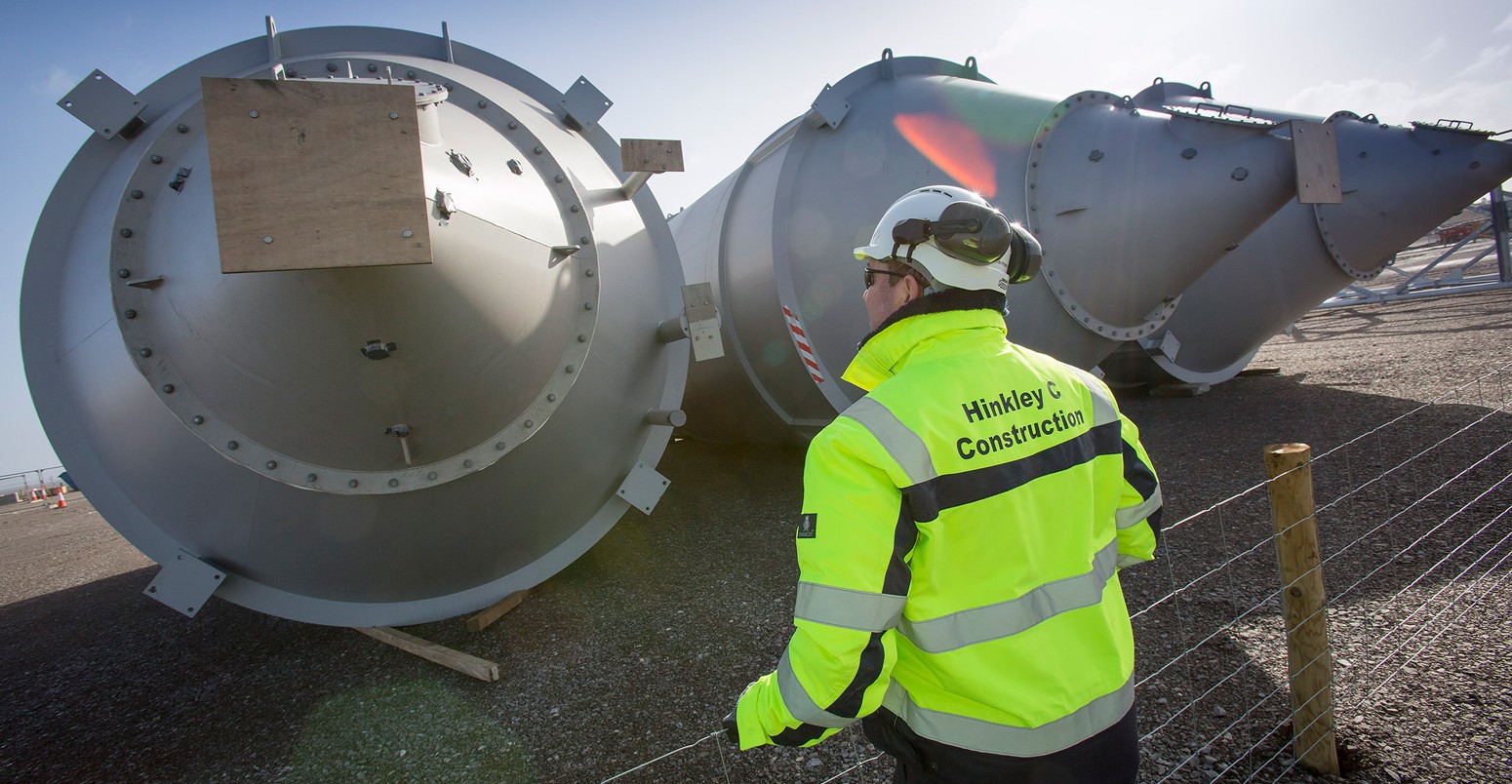
Media reaction: UK government approves Hinkley C nuclear power plant
Multiple Authors
09.16.16Multiple Authors
16.09.2016 | 2:28pmThe Hinkley C new nuclear plant has finally been given the go-ahead by prime minister Theresa May, after a two-month review that appears to have changed little.
You can read all about the details of the scheme in our Carbon Brief Q&A, including how much it is set to cost, how it will be paid for and what alternatives could step in if it is delayed.
The project has received unprecedented scrutiny from across the media, particularly after May’s post-Brexit review of Hinkley C pushed it onto the desks of senior political correspondents.
Carbon Brief rounds up the media reaction to the deal.
Editorial line
Most newspapers had taken a sceptical view of the scheme. Editorial headlines included “No point in Hinkley” in the Times, “A nuclear error” in the Sun and “Hinkley Pointless” in the Economist. You can see a full run-down of papers’ views on Hinkley in our updated editorial tracker.
Now that the plant has been approved, a few papers have softened their tone. For example the Sun headline is: “Brits must try to look on the bright side of Hinkley Point nuclear deal”. The Daily Mail says the prime minister “may have had no option but to approve” Hinkley C.
The Telegraph says: “We have had our misgivings [on Hinkley C]…because the economic arguments were never entirely convincing.” Even so, it concludes: “Arguments…are now at an end. The imperative is to get on and build the plant and the four others in the pipeline.”
Others remain sceptical. The Financial Times, under the headline: “An amber light for China in UK nuclear power”, says the government’s planned new rules governing foreign investment in critical infrastructure could still “put the Hinkley project in doubt” if they are sufficiently stringent.
“The last word on Hinkley may not have been written,” the FT adds. While May has “addressed the concerns of security chiefs with a compromise that avoids an outright block…[she] eschewed the chance to amend the commercial terms of the project, to be built at the gargantuan cost of £18bn.”
“Hinkley C is an unproven design that comes at a punitive cost,” argues the Guardian. While “keeping the lights on without adding to global warming at a price that consumers can afford is complex…nuclear, with its lethal waste and high decommissioning costs, is no long-term solution.”
The Guardian’s financial editor, Nils Pratley, says the project should have been “binned” on cost and design grounds. The Times editorial is also critical of the price EDF will be paid for Hinkley, which “Mrs May’s team appears to have made no attempt to renegotiate in the past two months.”
BBC Reality Check and the Mirror attempt to bottom out the cost of Hinkley C for consumers, both citing Carbon Brief’s analysis.
Energy shifts
Several of the papers focus on the relative cost of alternatives to Hinkley C. The Guardian editorial says the worst aspect of Theresa May’s decision is that it could “[drive] out investment in other, smarter, solutions which are the real technologies of the future”.
The prime minister has overlooked “dramatic advances and cost reductions in smart grid technology, solar power, energy storage and newer nuclear designs that could render Hinkley Point obsolete before it is completed,” the Times editorial argues.
A similar line is taken by various columnists. In the Telegraph, Ambrose Evans-Pritchard says Hinkley C will be “obsolete before it even starts… [it] will be overtaken by a host of cheaper technologies before it is even opened in the late 2020s, and risks degenerating into an epic white elephant “.
In another article looking at alternatives, Financial Times energy editor Andrew Ward poses the headline question: “Hinkley Point: Is the UK getting a good deal?”. Ward does not answer the question directly, though it’s probably worth recalling Betteridge’s Law of Headlines here.
In the Guardian, George Monbiot argues in favour of nuclear power but says “this preposterous white elephant [at Hinkley C] could scarcely be better designed to persuade people that nuclear energy is an expensive and dangerous distraction from the decisions we have to make.”
(Picking up on the frequently-used white elephant framing, Steve Bell has a cartoon of Theresa May riding an apparently rabid white elephant past a teetering wind turbine).
Also in the Guardian, Green Party co-leader, Caroline Lucas, argues that the “evidence for alternatives is clear: smart meters, home and grid-scale batteries that store and release excess renewable power, and other modern solutions would be cheaper and more efficient.”
Politically expedient
Many commentators agree that Hinkley C was largely a political decision. In the Telegraph, Matthew Lynn says: “forget the economics of Hinkley Point, the politics are convincing”.
As the Economist explains:
It adds:
While the Hinkley decision may have smoothed over the diplomatic cracks for now, it seems unlikely to have solved them altogether.
Energy editor Robin Pagnamenta writes in the Times that as the UK government’s statement on Hinkley gives no mention to China, it means “big questions persist over whether the Chinese will be willing to invest with so few assurances regarding their future investment plans.”
The FT’s Lex column notes that Hinkley’s approval “ends one game only to start another.” Doubts linger over whether China General Nuclear (CGN) will operate another new nuclear plant at Bradwell as originally envisaged, says Lex.
It adds:
Also in the FT, Nick Butler gives Theresa May a mark of 8.5 out of 10 for her decision on Hinkley. The compromise puts “national security ahead of everything” and “neatly shifts the onus of the decision on Hinkley back on to the shoulders of the EDF board,” he says: “If the Chinese do abandon the project, the French company will have to find the money if it still believes in the deal.”

